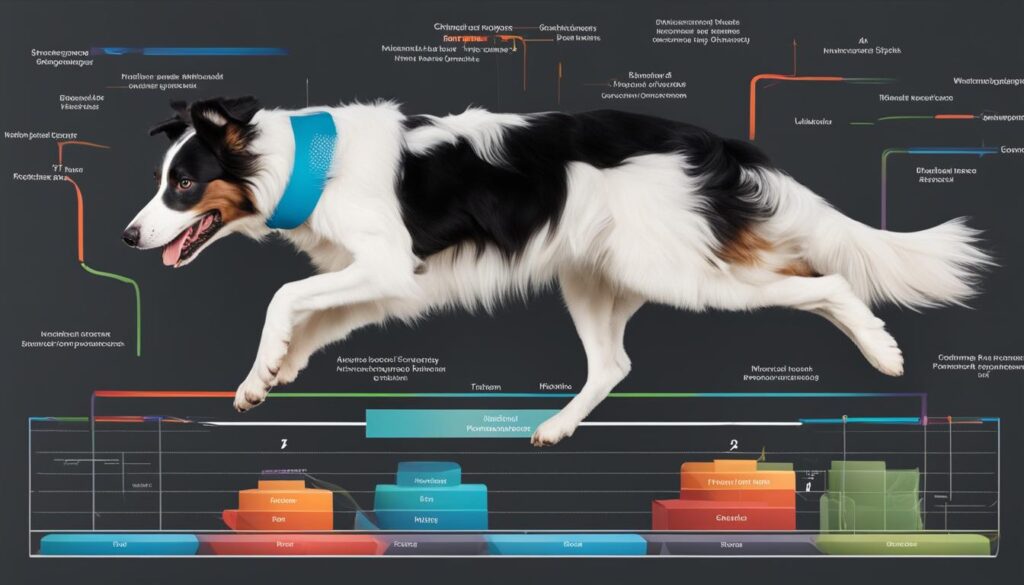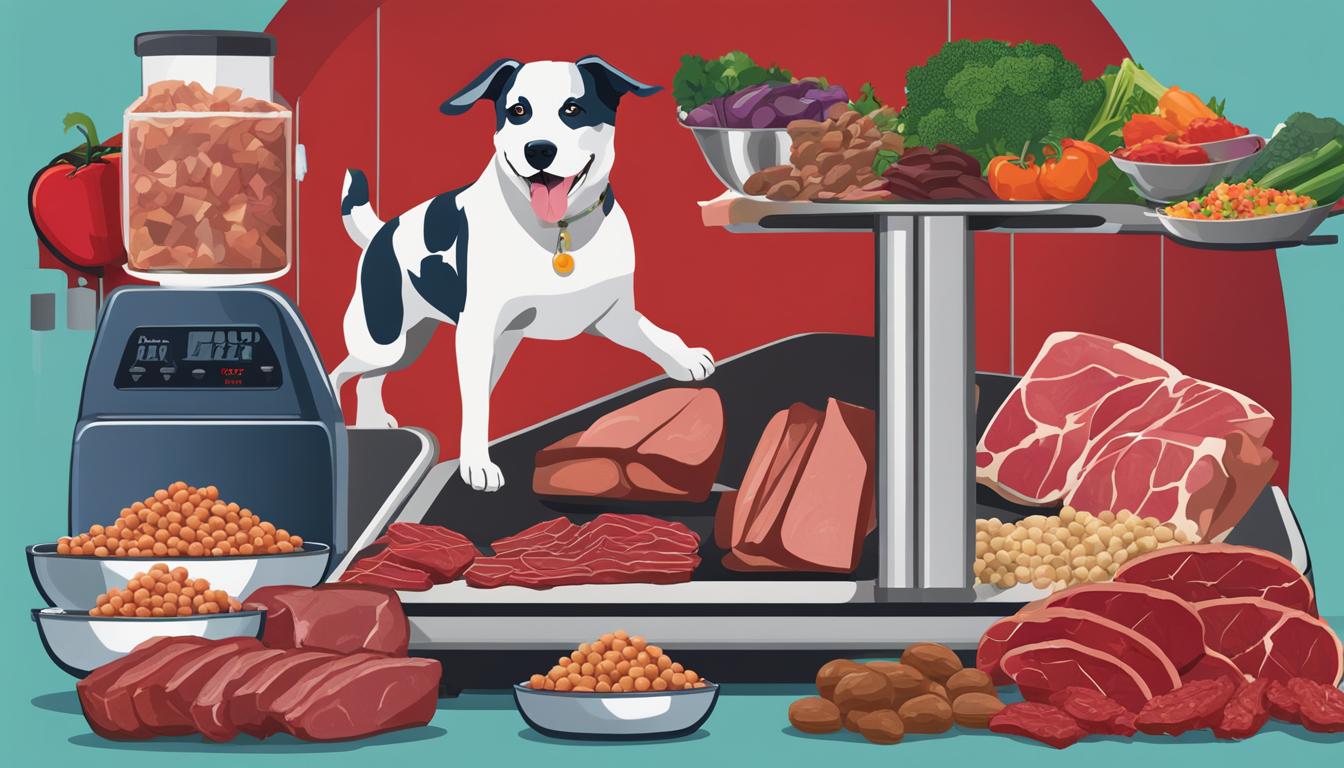Do you have an athletic dog that loves to run, jump, and play? If so, it’s important to fuel their performance with the right diet. Just like athletes rely on proper nutrition to excel in their sports, athletic dogs also need specialized diets to maximize their potential and stamina. Whether your furry friend participates in dog sports or simply loves high-energy activities, understanding their unique nutritional needs is key to keeping them at their best.
Key Takeaways:
- Athletic dogs require specialized diets to fuel their performance and promote stamina.
- Caloric needs vary based on the type and duration of exercise.
- Protein and fat play crucial roles in muscle development and energy production.
- The right balance of nutrients is essential for optimizing an athletic dog’s performance and overall health.
- Consulting with a veterinarian or canine nutritionist can help select the best performance dog food for your furry athlete.
Understanding Caloric Needs for Athletic Dogs
Athletic dogs have unique caloric needs that differ from sedentary dogs. To ensure they perform at their best, it is important to understand their energy requirements and provide them with the appropriate diet. The caloric needs of athletic dogs can be determined by multiplying their resting energy requirement by a factor that accounts for their activity level. However, the energy expenditure is directly related to the distance traveled during exercise. Short bursts of activity require fewer calories compared to endurance activities.
Table: Caloric Needs Based on Activity Level:
| Activity Level | Caloric Multiplier |
|---|---|
| Light exercise (less than 1 hour) | 1.6 |
| Moderate exercise (1-3 hours) | 2 |
| Heavy exercise (over 3 hours) | 3 |
Additionally, the running distance and leg length of a dog can also impact their calorie requirements. Different canine sports have varying energy requirements based on activity duration and intensity. For example, a dog participating in agility training may require a different diet compared to a dog involved in endurance running. It is important to consider these factors when feeding athletic dogs to ensure they receive the right amount of energy for optimal performance.
Fueling Canine Muscles for Optimal Performance
Muscles play a crucial role in a dog’s performance. Dogs have different types of muscle fibers, including type I (slow twitch) and type II (fast twitch) fibers. The duration of exercise determines the primary fuel source used by the muscles. Adenosine triphosphate (ATP) is used rapidly at the onset of activity, followed by the utilization of glucose and glycogen for aerobic or anaerobic metabolism. As exercise duration increases, dogs rely more on fat as an aerobic fuel source. Fat is more energy-dense than protein and carbohydrates, making it an important component of high-energy diets for athletic dogs.
To optimize muscle fueling for performance, it is crucial to provide a diet that includes adequate amounts of fat. Fat serves as a long-lasting source of energy, allowing dogs to sustain their efforts during prolonged activities. Incorporating high-quality fats into a dog’s diet can support endurance and enhance overall performance. Additionally, fat is essential for maintaining healthy skin and coat, providing insulation, and aiding in the absorption of fat-soluble vitamins.
“Fat plays a vital role in maintaining healthy skin and coat, providing insulation, and aiding in the absorption of fat-soluble vitamins.”
The Role of Protein in Muscle Development
Protein is another essential nutrient for athletic dogs. It promotes muscle growth, repair, and recovery, making it crucial for optimal performance. Active dogs require higher levels of protein compared to sedentary dogs, as protein supplies the necessary amino acids for muscle development and energy production during exercise.
Branched-chain amino acids (BCAAs) are particularly important for active dogs. These amino acids, including leucine, isoleucine, and valine, play a crucial role in providing energy to the muscles and supporting muscle growth. A diet rich in high-quality protein sources, such as lean meats, can help optimize a dog’s muscle fueling and overall performance.
| Protein Sources for Athletic Dogs | Benefits |
|---|---|
| Lean chicken or turkey | High-quality protein, low in fat |
| Beef or pork | Rich in essential amino acids |
| Fish | Good source of omega-3 fatty acids |
| Eggs | Complete protein with essential amino acids |
Optimizing Canine Diets for Athletic Performance
When designing a diet for an athletic dog, it is essential to consider both protein and fat as crucial components. A well-balanced diet that includes adequate amounts of high-quality protein and fat can fuel a dog’s muscles, promote endurance, and support overall performance.
Consulting with a veterinarian or canine nutritionist can provide valuable guidance in tailoring a diet plan that meets the specific requirements of a sporting dog. These professionals can evaluate the dog’s activity level, body condition, and any unique dietary needs to ensure a diet that maximizes performance and supports long-term health.

Considerations for Dietary Modification in Performance Dogs
When it comes to maximizing performance in athletic dogs, dietary modification plays a significant role. Choosing the right high-performance dog food and making necessary adjustments to the feeding schedule can make a noticeable difference in your dog’s energy levels, stamina, and overall performance. Additionally, certain performance-enhancing supplements can provide an extra boost to your dog’s athletic abilities.
Nutritional Requirements for Performance Dogs
Performance dogs have unique dietary needs based on their activity type and duration. Different sports and activities require varying levels of energy, muscle support, and joint health. For example, racing greyhounds and sled dogs have high energy requirements and may benefit from foods rich in lean protein and complex carbohydrates. On the other hand, agility dogs require diets that support quick bursts of energy and promote joint health.
To ensure optimal performance, it is important to select high-performance dog foods that meet these specific nutritional requirements. Look for foods that list high-quality protein sources as the primary ingredients, have sufficient fat content to provide energy, and contain additional supplements like glucosamine and chondroitin for joint support. Consulting with a veterinarian or canine nutritionist can help you make informed decisions about the best diet and supplements for your performance dog.
Comparing Performance Dog Foods
When comparing different performance dog foods, it’s important to look beyond the guaranteed analysis on the packaging. Expressing nutrients on a caloric basis allows for a more accurate comparison. Consider the protein, fat, and carbohydrate content of each food, as well as the quality of the ingredients. Reading reviews from other performance dog owners can also provide insights into the effectiveness of specific brands or formulas.
| Brand | Protein Content | Fat Content | Carbohydrate Content | Customer Rating |
|---|---|---|---|---|
| Brand A | 30% | 15% | 50% | ★★★★☆ |
| Brand B | 28% | 18% | 48% | ★★★☆☆ |
| Brand C | 35% | 12% | 45% | ★★★★★ |
Table: Comparison of protein, fat, and carbohydrate content in different performance dog foods
By considering the specific needs of your performance dog and carefully evaluating the nutritional profile of different foods, you can select the best option to support their overall health and maximize their athletic potential.

“The right diet can make a world of difference in an athletic dog’s performance. I’ve noticed a significant improvement in my dog’s endurance and energy levels since switching to a high-performance diet. It’s amazing how a few dietary modifications can impact their overall performance!”
The Role of Protein in Athletic Dog Diets
Protein plays a crucial role in the diet of athletic dogs, providing them with the necessary building blocks for muscle growth, repair, and recovery. Active dogs require higher protein levels compared to sedentary dogs to support their increased physical activity and maintain optimal health. Amino acids, the components of protein, are essential for muscle development and energy production during exercise.
When selecting a high-protein diet for your active dog, look for quality protein sources listed as the primary ingredients. This can include whole meats like chicken, beef, or fish. It is important to consider the digestibility of the protein, as well as the overall amino acid profile. Branched-chain amino acids (BCAAs) are especially important for active dogs, as they provide energy and support muscle growth.
Feeding your athletic dog a diet rich in quality protein can help promote muscle strength, endurance, and overall performance. It is recommended to consult with a veterinarian or canine nutritionist to determine the appropriate protein levels for your dog’s specific needs and activity level. Additionally, they can help you evaluate the protein content and quality of different dog food options to ensure you are providing the best nutrition for your athletic companion.
| Benefits of Protein in Athletic Dog Diets | Examples of High-Protein Foods |
|---|---|
| Promotes muscle growth and repair | Chicken, turkey, beef, fish |
| Supports energy production during exercise | Salmon, lamb, venison |
| Aids in muscle recovery after intense activity | Eggs, cottage cheese, Greek yogurt |
“Protein is the fuel that helps your athletic dog go the extra mile and perform at their best. It provides the necessary nutrients for muscle growth, repair, and recovery. Choose high-quality, animal-based protein sources to ensure your dog is getting the essential amino acids they need to thrive.”
Key Takeaways:
- Protein is crucial for muscle growth, repair, and recovery in athletic dogs.
- Athletic dogs require higher protein levels compared to sedentary dogs.
- Branched-chain amino acids (BCAAs) are important for energy and muscle support.
- Choose high-quality protein sources and consult with a professional to determine the appropriate protein levels for your dog.
The Importance of Fat in Athletic Dog Diets
Adequate fat intake plays a critical role in maximizing the performance of athletic dogs. Fat serves as a primary energy source during rest and most types of exercise, making it essential for fueling the muscles of active dogs. Compared to carbohydrates and protein, fat is more energy-dense, allowing dogs to consume fewer calories while maintaining an active lifestyle.
In addition to providing energy, fat also plays a vital role in optimizing a dog’s metabolism and promoting endurance and overall fitness. It helps dogs maintain healthy skin and coat, provides insulation, and aids in the absorption of fat-soluble vitamins. Including sufficient amounts of fat in the diet of athletic dogs helps support their physical performance and overall well-being.

Benefits of Fat in Athletic Dog Diets
The benefits of fat in athletic dog diets are numerous:
- Energy source: Fat provides a concentrated form of energy, allowing dogs to sustain high activity levels without excessive calorie intake.
- Endurance: Fat metabolism provides a steady and long-lasting source of energy, essential for dogs engaged in endurance activities like agility trials or long-distance running.
- Insulation: Fat acts as insulation, helping to regulate body temperature and protect vital organs during intense physical activities.
- Joint health: Adequate fat intake supports joint health, reducing the risk of injuries and promoting overall mobility in active dogs.
- Vitamin absorption: Fat-soluble vitamins, such as vitamins A, D, E, and K, require fat for proper absorption. Including fat in the diet ensures these essential vitamins are utilized effectively.
It’s important to note that fat should be included as part of a balanced diet, along with appropriate levels of protein and carbohydrates, to meet the specific nutritional needs of athletic dogs.
Dietary Recommendations for Athletic Dogs
To ensure athletic dogs receive the necessary fat intake, it is recommended to choose high-energy diets specifically formulated for active dogs. These diets typically have increased fat content to support performance and endurance.
When selecting a performance dog food, look for high-quality protein sources listed as primary ingredients, along with sufficient fat content to provide the required energy for physical activities. Complex carbohydrates can offer sustained energy for endurance activities. Joint support ingredients like glucosamine and chondroitin can be beneficial for dogs involved in high-impact activities.
| Dietary Recommendation | Explanation |
|---|---|
| Choose high-energy diets | These diets are specifically formulated for active dogs and have increased fat content to support performance and endurance. |
| Select high-quality protein sources | Look for whole meats listed as primary ingredients to ensure adequate protein intake for muscle growth and recovery. |
| Ensure sufficient fat content | Fat should provide the necessary energy for physical activities, helping dogs maintain an active lifestyle. |
| Incorporate complex carbohydrates | Complex carbohydrates provide sustained energy for endurance activities. |
| Consider joint support ingredients | Glucosamine and chondroitin can support joint health in dogs involved in high-impact activities. |
It is always recommended to consult with a veterinarian or canine nutritionist to determine the best diet plan for your athletic dog, considering their individual needs and specific requirements of their sport.
Selecting the Right Performance Dog Food
Choosing the right performance dog food is crucial for supporting the athletic endeavors of your furry companion. A well-balanced diet can provide the essential nutrients needed to fuel their muscles, enhance endurance, and promote overall health. Here are some factors to consider when selecting the perfect dog food for athletic dogs.
High-Quality Protein Sources
Look for dog foods that list high-quality protein sources, such as whole meats, as the primary ingredients. Protein is essential for muscle growth and repair, making it a vital component of an athletic dog’s diet. It is recommended to choose dog foods that contain animal-based proteins like chicken, beef, or fish, as they are more easily digestible and provide a complete amino acid profile for optimal muscle function.
Sufficient Fat Content
Athletic dogs require higher proportions of fat in their diets to support their active lifestyle. Fat is a concentrated source of energy and provides the fuel needed for sustained physical activities. Look for dog foods that contain healthy fats like omega-3 fatty acids, which can help reduce inflammation and support joint health. Adequate fat intake also promotes a shiny coat and healthy skin for your furry athlete.
Complex Carbohydrates
For endurance activities, complex carbohydrates can provide sustained energy for your athletic dog. These carbohydrates are slowly digested, releasing a steady stream of glucose into the bloodstream, which helps fuel their muscles during prolonged exercise. Look for dog foods that contain whole grains like brown rice or oats, which are rich in fiber and provide a steady release of energy throughout the day.
| Feature | Importance |
|---|---|
| High-quality protein sources | Essential for muscle growth and repair |
| Sufficient fat content | Provides energy and supports joint health |
| Complex carbohydrates | Sustained energy for endurance activities |
By considering these factors and consulting with a veterinarian or canine nutritionist, you can ensure that your athletic dog receives the optimal nutrition they need to excel in their sports and maintain a healthy, active lifestyle. Remember, every dog is unique, so finding the right performance dog food may require some trial and error to discover what works best for your furry athlete.
Conclusion
Maximizing performance in athletic dogs requires a specialized diet that meets their unique nutritional needs. The right balance of protein, fat, and carbohydrates is crucial for fueling their muscles, promoting endurance, and supporting overall health.
Careful consideration should be given to the type and duration of exercise, as well as the specific requirements of the dog’s sport. Each sport demands different energy levels and nutrient compositions, so tailoring the diet accordingly can make a significant difference in performance.
By providing a well-balanced diet and considering dietary modifications and supplements, owners can help their athletic dogs reach their full potential and achieve optimal performance. Consulting with a veterinarian or canine nutritionist can provide further guidance in formulating a diet and selecting the right supplements to support the dog’s specific needs.
Remember, each dog is unique, and their dietary requirements may vary. It’s essential to monitor their performance and make adjustments as necessary. With the right nutrition and care, your athletic dog can excel in their chosen activities and enjoy a healthy and active lifestyle.
FAQ
What kind of diet does an athletic dog need?
Athletic dogs require specialized diets to maximize their potential and stamina. The right balance of protein, fat, and carbohydrates is crucial for fueling their muscles, promoting endurance, and supporting overall health.
How do I determine the caloric needs of my athletic dog?
The caloric requirements of athletic dogs vary depending on the type of activity they participate in. The distance traveled during exercise directly affects their energy expenditure. It is important to modify their diet based on the type and duration of exercise to ensure optimal performance.
What role does protein play in an athletic dog’s diet?
Protein is essential for muscle growth and recovery in athletic dogs. Active dogs require higher protein levels compared to sedentary dogs. Feeding them a diet high in quality protein can help optimize their performance and overall health.
How important is fat in an athletic dog’s diet?
Fat is a primary energy source for dogs during rest and most types of exercise. Active dogs require higher proportions of fat in their diets to fuel their muscles. Adequate fat intake also helps optimize their metabolism and promote endurance and overall fitness.
What should I look for when selecting a performance dog food?
When choosing a performance dog food, consider high-quality protein sources, sufficient fat content for energy, complex carbohydrates for sustained energy, joint support ingredients for high-impact activities, digestibility, and absence of fillers and artificial additives.





